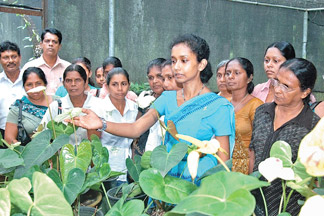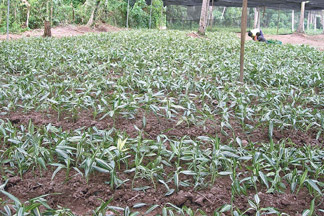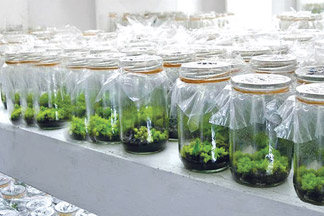Floriculture as a thriving business
By Dhaneshi YATAWARA

Training program on Anthurium at the Peradeniya Botanic Garden |

Growing foliage in new techniques |
Growing flowers is not just a hobby anymore. The effect of flowers
based on various cultures of the world has turned in to a lucrative
business. Cut flowers, cut foliage as well as live plants comprise a
significant percentage of the world market. And above all, today the
word is not 'growing flowers' but it is floriculture.
Sri Lanka, being a tropical paradise with a high density of plant
species stands a better chance in this trade with a little support of
modern technology. Floriculture, as a business, has been in existence in
Sri Lanka for a considerable period of time. Yet being more exposed to
the world market more were the chances that flew in to this country
providing space for floriculture to expand.
Today it stands as one of the most popular self employment ventures -
both among the rural and urban communities.
Though all the growers are private individuals this business is under
close supervision of the Department of National Botanic Gardens which
comes under the Ministry of Economic Development Ministry.
"The Department of National Botanic Gardens helps those involved in
the floriculture sector realise their true potential and achieve greater
economic profits with sustainable development of their cultivations,
their surrounding environment, villages, towns, cities and the country
as a whole," said Director General of the National Botanic Gardens
Department Dr. Siril Wijesundara.
"The floriculture sector in Sri Lanka emerged as a lucrative foreign
exchange earning venture in the recent past and with the inception of 'Divi
Neguma' Program under the guidance of Economic Development Minister
Basil Rajapaksa floriculture is identified as one of the best ventures
for self employment," Dr. Wijesundara said.
The special efforts to make this sector further developed to generate
income and provide more employment became a high priority, in order to
economically strengthen a Family unit. Thus started the 'Suwahas Mal'
program to promote floriculture and enhance the business potential of
existing growers.
As Dr. Wijesundara explained, although the floriculture industry in
Sri Lanka has an enormous potential for expansion, there are several
constraints hindering its growth. Lack of modern and improved cultivars
and shortage of good quality planting material is one. Popularising
micropropagation is one of the best attempts. Micropropagation is
growing plants using tissue culture technology. The advantage is that
this method provides similar plants with identical characteristics which
is a key factor in exporting flowers and foliage.
Breeding of cut flowers and ornamentals suitable for the floriculture
industry commenced in the 1970s and is being continued to date.
According to Wijesundara, the facility for Micropropagation was
initiated in the early 1970s and has since developed into a research and
production laboratory of micropropagated Orchids, Anthuriums, Ferns and
native plants of Sri Lanka.
|

Growing plants using tissue culture |
Lack of access to modern knowledge and technology in cultivation,
lack of financial incentives to modernise cultivation facilities, lack
of appropriate transportation and storage facilities, absence of quality
standards for planting materials and cut-flowers are some of the other
problems that tends to inhibit the growth of the industry.
'Suwahas Mal' program is created in order to create a conducive
environment for this lucrative industry. The Economic Development
Ministry, through the network of Botanic Gardens of the country conducts
flower exhibitions and create a market place for the flower growers of
the locality.
New varieties
Using native plants, botanists are now trying to create new varieties
of ornamental plants to suit the world market. Although Sri Lanka lost
ownership of few yet highly valuable plants as a result of gene piracy,
we still have more in store of our bio diversity treasures. The
Department of Botanic Gardens continues to research on this. "Select and
introduce indigenous species as new floriculture crops, produce good
quality planting material through large scale tissue culture facilities
and distribute among growers are among the main priorities to upgrade
this industry," Dr. Wijesundara added.
The Department of Botanic Gardens continuously conducts in-house
training programs for those who are actively involved in this industry
on modern cultural practices, post harvest handling and marketing. "
Utilisation of unproductive lands or abandoned cultivation sites to grow
high value crops for higher income generation is another aspect we need
to look in to," he added.
The Department of National Botanic Gardens has launched and
implemented two development programs at field level; the "Suwahas Mal"
program to assist middle and small scale growers as well as the "Divi
Naguma" programe to assist large scale and middle level growers.
Technical know-how and assistance in infrastructure development is
provided by this department under the above programs while marketing
assistance is provided to small and medium growers by organising
exhibitions cum plant sales in urban areas.
Planting material is also imported and distributed to these growers.
However, technical assistance in post-harvest management as well as
other research areas are required for better potential.
"The industry can grow much further as the Government under the 'Mahinda
Chinthana' is aiming at enhancing the economic stability of the rural
masses.
We have a skilled labour force in this industry and the only issue is
that we need more growers.
Which means more people need to come in to this business," he added.
As more people can be employed per hectare, this industry indirectly
provides job opportunities to many people. "Sri Lanka has a diverse
climate suitable for numerous crops, and as even the marginal lands can
be used to grow export quality flowers and foliage we do have a better
future in floriculture industry," Dr. Wijesundara added. |

